13 Facebook Marketplace Safety Tips
Peer-to-peer online selling and swapping sites like Facebook Marketplace are growing like crazy and for good reason. With respect to eco-friendly living, they’re a great way to pass along things you no longer need and acquire secondhand items within your community. But is Facebook Marketplace safe? Here are 13 Facebook Marketplace safety tips to use when buying and selling on Facebook Marketplace (and other online peer-to-peer sales sites).
This is part of our How To Master Secondhand Shopping Resource Guide.

If you’ve been around the blog for a hot second, you know I really like Buy Nothing groups, Facebook Marketplace, and shopping secondhand. I shared several articles about how Buy Nothing groups have worked out well for us and some really helpful tips for making a bit of extra money on Facebook Marketplace.
While consumer-to-consumer buying, selling, and swapping sites provide a lot of value, they also bear their fair share of risks when not used or managed with care. Not long ago, ProPublica issued an article criticizing Facebook for its lack of due care in managing the rising crime associated with Facebook Marketplace. This is definitely not the first article of its kind but one of the deeper dives into and critiques of the media giant.
I believe that by and large, people are good and the vast majority of transactions on Facebook Marketplace are genuine and safe. However, as an advocate for peer-to-peer swapping and selling platforms, I thought it was worthwhile to share some Facebook Marketplace best practices and ways to stay safe when using these platforms. There are certain things to look out for when considering if posts and profiles are fraudulent, misleading, or dangerous.
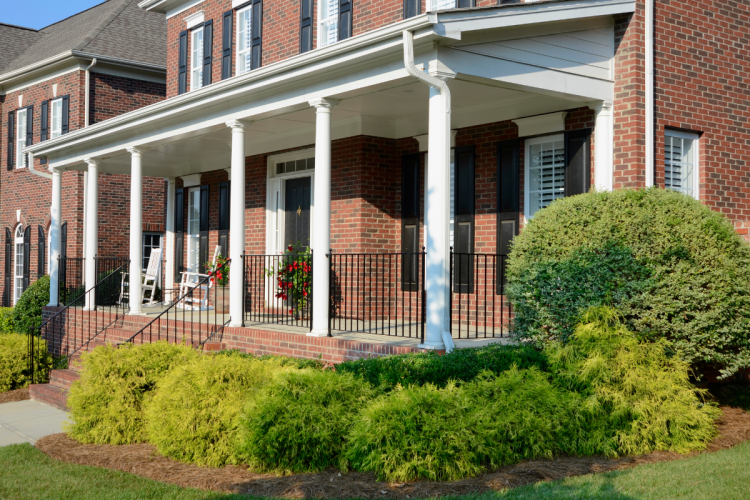
13 Facebook Marketplace Safety Tips
Below, I’ve gathered ten tips to stay safe when using Facebook Marketplace and other peer-to-peer selling and swapping sites. Be sure to consider these when exchanging goods and services with neighbors or buying and selling secondhand with those in your community (and specifically, those who appear but may not actually be in your community).
1. Don’t Disclose Personal Information
There’s rarely a need to disclose personal information about your family, personal identification information, or other private data. Disclose this information only as needed and with caution. You may even consider creating a separate Facebook profile just for Marketplace transactions to separate your personal and business activities.
At times it may be useful to share personal information like your address. In some cases, for example, we’ve had people come to our house to pick up large items like doors and heavy carpets we couldn’t transport. We had to give them our address. But we’re pretty particular about not giving out specific information until just before the person arrives. At least it limits the number of people who will ask for the information and fail to follow through on picking up the items.
Furthermore, in all cases where items were picked up at our home, we have left them for contactless pickup or put them in our driveway or garage so the person is not entering our home. In all cases, we will not accept pickups when one of us is home alone. Be sure a spouse or adult family member, neighbor, or friend is home with you if you must have the person come to your home to pick up their item.

2. Know That Profiles May Be Fake
Some peer-to-peer sales platforms don’t require user profiles. Others, like Facebook Marketplace, offer a false sense of security by requiring users to complete a profile. Don’t place a lot of stock in user profiles. It’s very easy to create fake user profiles and many of the fraudsters on Facebook Marketplace use fake profiles to lure in potential victims.
Some profiles are sufficient enough to suggest they are real (though we can never be sure, of course). But be especially aware of slim profiles without much substance. They aren’t all bad. Some people create stand-alone profiles just to use Marketplace or Buy Nothing Groups, for example, even though they don’t use Facebook for social updates. But it could be an indication of something suspicious.
Related Reading: Answers To Your Buy Nothing Group Concerns and Questions
It’s also pretty easy to hack a Facebook profile or other user profile and use a hacked account to fraudulently transact on Marketplace or other sales platforms. Digital profiles are an easy way to pretend to be someone or something we’re not.
3. Communicate Safely with Sellers and Buyers
When using Facebook Marketplace, always use Facebook Messenger to communicate with the other party. This allows you to keep a record of your conversations and helps protect your personal information. Avoid sharing your phone number or email address, as some scammers might try to move the conversation outside of Facebook Messenger to avoid being reported or blocked.
Additionally, pay attention to any red flags in the language, style, or behavior of the person you’re communicating with. If they’re pushy, vague, or overly anxious to complete the transaction, this could be a sign of a potential scam. Similarly, be cautious of buyers or sellers asking you to pay with gift cards. This form of payment is typically associated with scams. See more below about identifying and reporting potential scams on Facebook Marketplace.
4. Meet In A Public Place
One of the most crucial aspects of staying safe while using Facebook Marketplace is meeting for transactions in safe locations. Ideally, you should choose a public and neutral place for any meetups. To ensure your safety, consider the following tips:
- Opt for well-lit and busy locations, such as shopping centers, grocery store parking lots, coffee shops, or near a police station
- Some police stations offer designated parking spots for online transactions, which can provide an extra layer of security when buying or selling items on Facebook Marketplace.
- Always inform a trusted friend or family member about your plans, including the time, date, and location of the meetup.
With respect to the other person in the transaction, coordinate in advance to determine exactly where you will meet, what type of car they are driving, and other identifiable details so you can arrive knowing what to expect.
5. Pick Up or Drop Off Items With a Friend
There may be times when it makes the most sense to pick up something directly from a person’s home or personal space. Large furniture, for example, may require a special vehicle, and it would be impractical to expect both parties to use such a vehicle to meet at a central, public location.
Related Reading: 25 Tips on Flipping Furniture for Beginners
If you must go to a person’s house or private place to exchange goods, there are still ways to minimize risk:
- Arrange for someone like a spouse or friend to be with you during the exchange or let your neighbors know when the transaction is expected to take place.
- Make sure your phone is fully charged and accessible for quick access in case of emergencies.
- If you feel uncomfortable for any reason, trust your instincts and consider postponing or canceling the transaction.
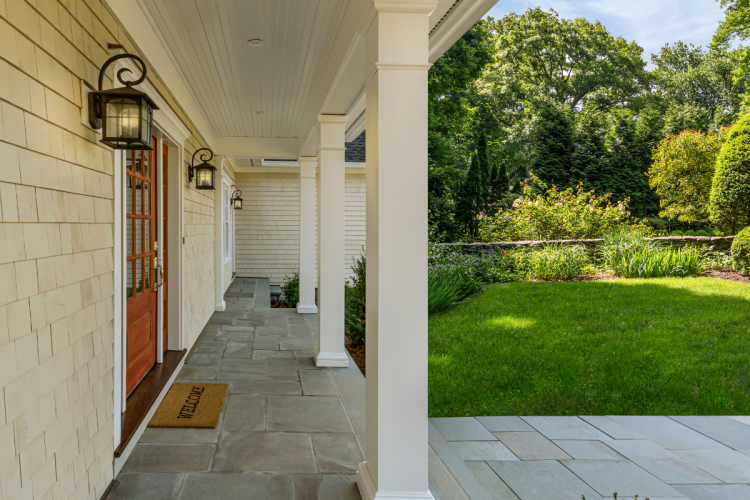
6. Rely On Contactless Pick Up When Possible
The pandemic taught us a lot about contactless transactions. To the extent possible, negotiate contactless pickup or drop-off. This may or may not be possible depending on the item you’re purchasing or selling. But in many cases, you can leave a product on a porch or at the end of the driveway so you do not have to interact with the other person.
It sounds a little anti-social (and unfortunate when we want to trust those in our community) but it can limit the risk of a dangerous interaction with a bad apple.
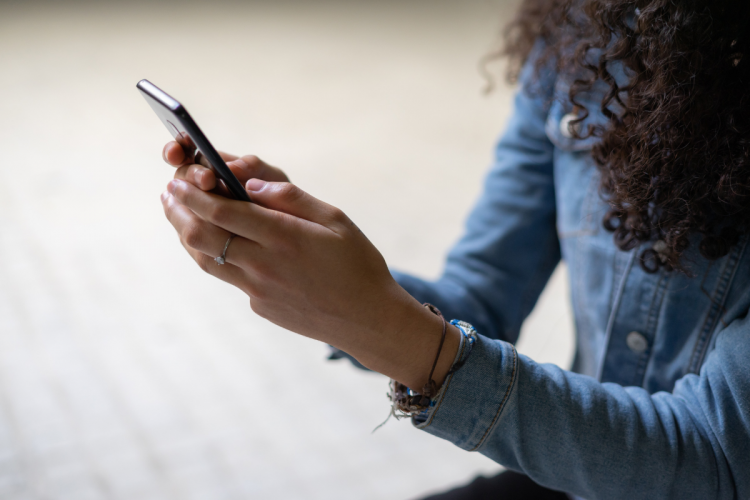
7. Use Instant Electronic Transfers (or Small Amounts of Cash) At The Time of Exchange
To limit the risk of giving something away without requisite payment or sending payment and never receiving goods, use electronic transfers or small amounts of cash at the time of exchange. You don’t want to provide something and not get paid or pay in advance and have the person not show up.
Avoid direct bank transfers, and use more anonymous and secure payment methods like Google Pay, Apple Pay, Venmo, Paypal, and Zelle that allow you to exchange cash with just a username or email address. Do not offer your bank account information. Someone asking for this information is more than likely up to no good.
8. Stick To Local Transactions
It’s easy for scammers to request payment and not provide goods if you’re paying in advance and something is not delivered via mail, for example. There is little recourse with Facebook Marketplace if you pay for something and never receive it. Prioritize local transactions to limit the risk that you never receive the goods you’ve ordered after payment.
9. Consider The Credibility and Legitimacy of the Listing
Be thoughtful about the nature of the items being listed; consider if it sounds reasonable and practical. If the listing sounds too good to be true, it probably is. If the price is significantly lower than similar items of the same nature (especially large purchases like used vehicles), it’s probably not legitimate.
If someone has lots of a particular item (such that it seems crazy), it’s probably stolen goods. If a large item is posted in multiple locations, it’s probably a fraudulent post because it’s unlikely it could be delivered in all those different places.
There are a number of different scenarios when a post just doesn’t make sense. Be mindful of inconsistencies and know they are probably an indication of something suspicious.
As an example, the Pro Publica article highlighted one posting for 200 bottles of Tide detergent. Who has 200 bottles of Tide detergent? That’s likely stolen, and not someone with whom you want to do business (even if they have no intention of causing you any harm).
If you see a car for sale listed in many different and disparate geographic areas, that’s probably a fraudulent post. They’ll ask for your money and never deliver the car. And they’re probably trying to “sell” it to people in a lot of other places as well.
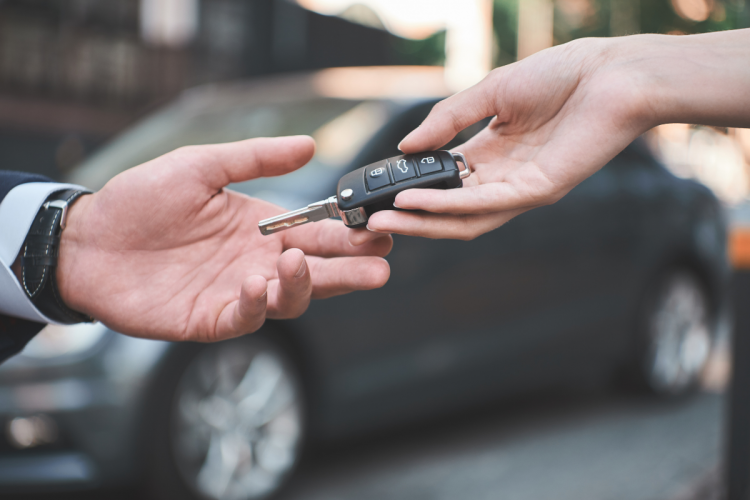
10. Limit High-Value Transactions On These Platforms
Consider steering clear of these types of platforms for high-value transactions. They cause issues in several ways. Showing up to a transaction with a large amount of cash makes you a perfect target for a thief, even in a public location. Paying for an item of high value before receiving it may result in never actually taking delivery of your purchase. Selling an item without receipt of payment before transferring the goods may mean you never get paid.
Some platforms have guarantees or payment protection plans that help reduce fraud. eBay, for example, has a $100,000 Vehicle Purchase Protection Plan while Facebook Marketplace has nothing like this (and doesn’t seem that interested currently in starting to use something like it). It might be worth limiting large purchases and sales to platforms with fraud prevention policies or guarantees like the one eBay has.
If you do choose to use peer-to-peer platforms for large purchases and sales, understand the risks and be mindful (as noted above) of things that look too good to be true. They probably are.
11. Watch Out For Buyer Scams
While most scams on peer-to-peer networks target buyers and are executed by fake sellers, there is an increasing number of fake buyer scams gaining popularity. In these cases, someone pretends to be a legitimate buyer but intends to swindle the authentic seller out of money. Here’s one example of how this works.
Just recently, I listed a large piece of furniture for sale on Facebook Marketplace. Within just a few minutes, I had two buyer inquiries. However, both of them offered to buy the rather expensive piece of furniture sight unseen and with next to no questions about the quality of the item.
More suspiciously, both buyers required the use of Zelle (and no other payment platform), quickly asked for my Zelle name and email, and were adamant about paying right away – days before we would exchange the piece of furniture. This all felt too odd to me.
To validate my initial expectation that this was not legitimate, I pushed back on the payment transaction, suggesting we wait until we meet up to see if they actually want to purchase the furniture once they see it. I said I didn’t use Zelle and requested a different payment method. They adamantly rejected both considerations. It was clear this was not a true purchase offer.
A little internet searching led me to the answer; this was a standard form of intended fraud regularly executed using Zelle. It doesn’t appear to be a problem specific to Zelle. It can happen with any type of payment app. Effectively, the buyer pretends to make a payment. Then they either get the goods without a real cash transfer or ask for a refund when the payment was never really made. So ultimately, the seller pays the fraudulent buyer and gets scammed.
12. Report Probable Scams
Scammers will find ways to use Facebook Marketplace for their benefit, but we can help limit scams by reporting them to Facebook. To report a listing that you believe is a scam, follow these steps according to the Facebook Help Center:
- Click on the Marketplace icon.
- Select the listing you want to report.
- Click below the listing title.
- Click ‘Report Listing,’ then click ‘Scam.’
- Follow the on-screen instructions to submit your report.
13. Use Good Judgment & Follow Your Instinct
In the end, there are a variety of cliches around this, but if it sounds too good to be true, it probably is. Make sure it passes the smell test (if it smells fishy, it probably is). If something about the transition feels odd or unusual, slow down and reconsider. There are too many scams on peer-to-peer online sales platforms to use them without a reasonable dose of skepticism.
Swaps Groups Probably Have Fewer Risks
Cash or high-valued goods drive most of the fraud in these online marketplaces. Thus, swap groups and Buy Nothing groups where no cash is exchanged and goods tend to be lower in value (relative to things like used cars and apartment leases) attract fewer fraudsters and criminals.
That doesn’t mean they won’t exist, so you still need to be vigilant. But you’re probably less likely to encounter trouble, especially when you have small groups and start to see recurring profiles participating in swap discussions.
Fraud Won’t End But Know & Respect The Risks
There are many ways criminals will continue to perpetrate fraud through peer-to-peer selling applications. None of these tips is foolproof. There isn’t really a way to be 100% sure you won’t fall victim to scams without ending the use of them entirely. Technology, review, and stronger oversight and operational controls might reduce the amount of fraud. But we still must be diligent about using these platforms responsibly.
I’m not the ultimate expert on using these networks’ safety. I’ll continue using them with due care because I believe that they’re valuable and generally made up of good people with the best intentions. However, as an advocate of these networks, I also felt it prudent to note that transacting through these platforms does require a certain level of diligence and thoughtful consideration when managing relationships and interactions with other buyers and sellers.
How To Make Money Using Facebook Marketplace
With some tips around Facebook Marketplace safety, it’s time to get selling and make a little extra money. How about earning $3,000 in one month? That’s probably not likely for most people, especially if you aren’t selling full-time, but it’s definitely possible (and a great way to participate in a circular economy that keeps things out of landfills and gives old things new life).
My boys have sold a ton of their LEGO sets online and made over $1,200, a serious haul for elementary school kids. I organize all the postings and manage communication because they are too young to do this safely. But if you have valuable things to sell, it’s proof that you can make some real money, and I shared a bunch of our tips for selling on Facebook Marketplace in this post all about the money made selling LEGO.
For even more Facebook Marketplace selling tips, I was so excited to team up with Kat from Junkyard Journals, an experienced online seller. Recently, she made $3,000 in one month selling on Facebook Marketplace while responsibly decluttering her home, and she’s sharing all her best tips and tricks! Let’s dive in.
1. Price Items Well
I stick to at least 50% off the retail price or less depending on the condition and perceived desirability of the item. Remember that just because something is sentimental to you doesn’t increase its value for someone else.
If I purchased something secondhand and then go to sell it, I typically price based on the true retail price and not the price I paid. Oftentimes, I’ll come out even or earn a little profit to pocket when I sell items I purchased secondhand. Just another reason I love buying secondhand in the first place!
2. Take Clear Photos
Styled photos are great but can be time-consuming. A clear photo holding something up against a white wall will really help buyers see what you’re selling quickly as they scroll through.
3. Clean & Fix Items
A wash, a wipe, or a stitch can go a long way. Be honest about the condition of the items and price accordingly.
Head on over to the full post to read the rest of her 10 tips for making money selling on Facebook Marketplace. She’s a real pro and always has some useful (and profitable) tips to offer!
If you liked Facebook Marketplace safety tips, you might also like
25 Tips on Flipping Furniture for Beginners (mostly sold on Facebook Marketplace)
How We Made $1,200+ Selling LEGO Sets on Facebook Marketplace
10 Types of Secondhand Stores and Why We Love Them

Jen Panaro
Jen Panaro, founder and editor-in-chief of Honestly Modern, is a self-proclaimed composting nerd and advocate for sustainable living for modern families. To find her latest work, subscribe to her newsletter, Stepping Stones.
In her spare time, she’s a serial library book borrower, a messy gardener, and a mom of two boys who spends a lot of time in hockey rinks and on baseball fields.
You can find more of her work at Raising Global Kidizens, an online space to help parents and caregivers raise the next generation of responsible global citizens.
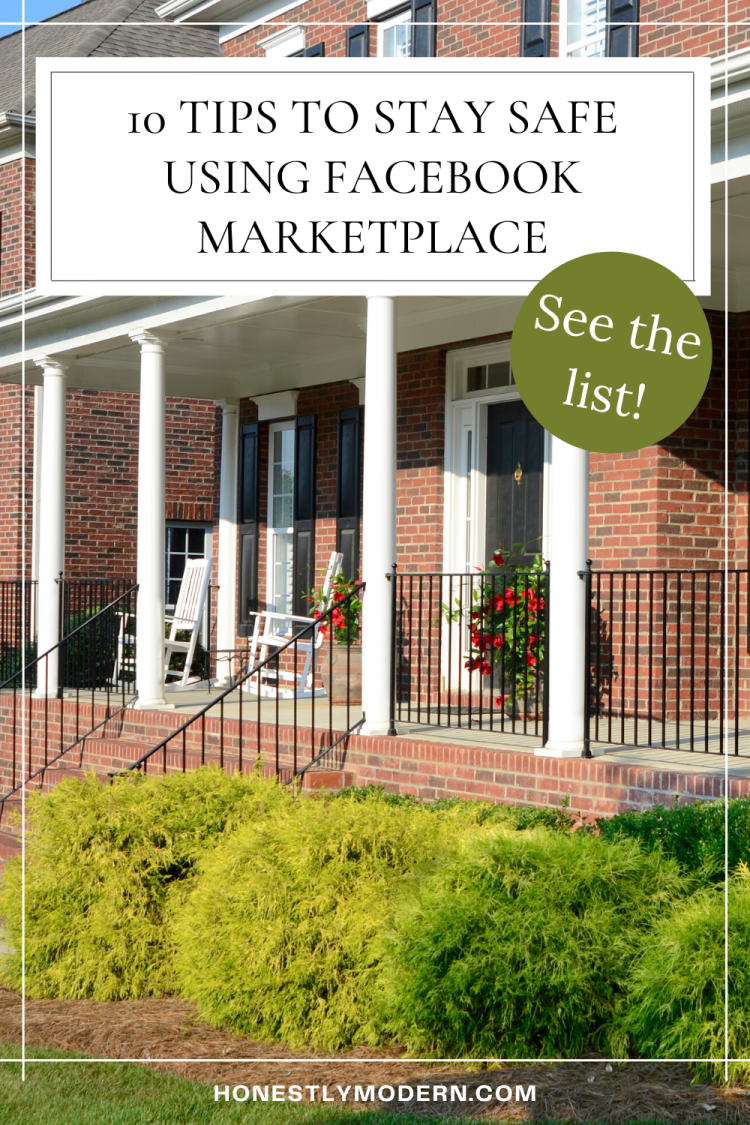

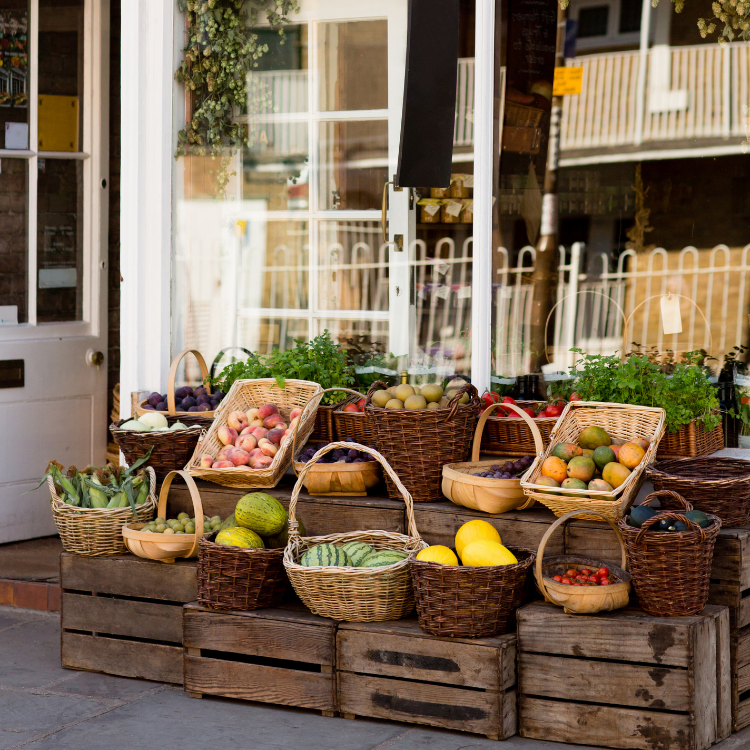

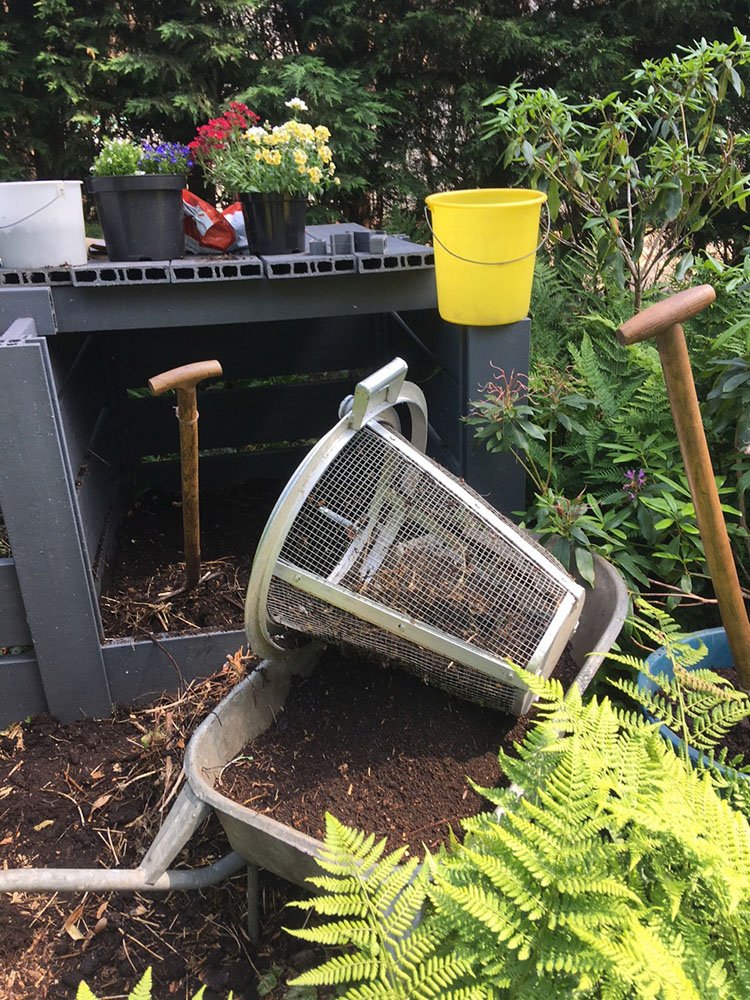
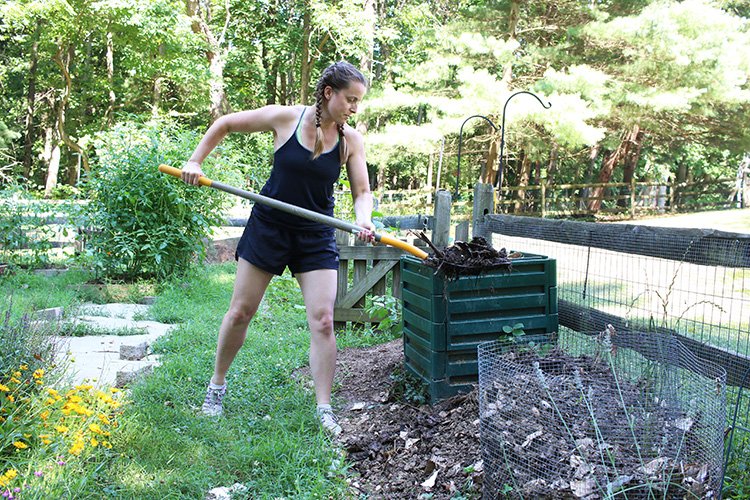

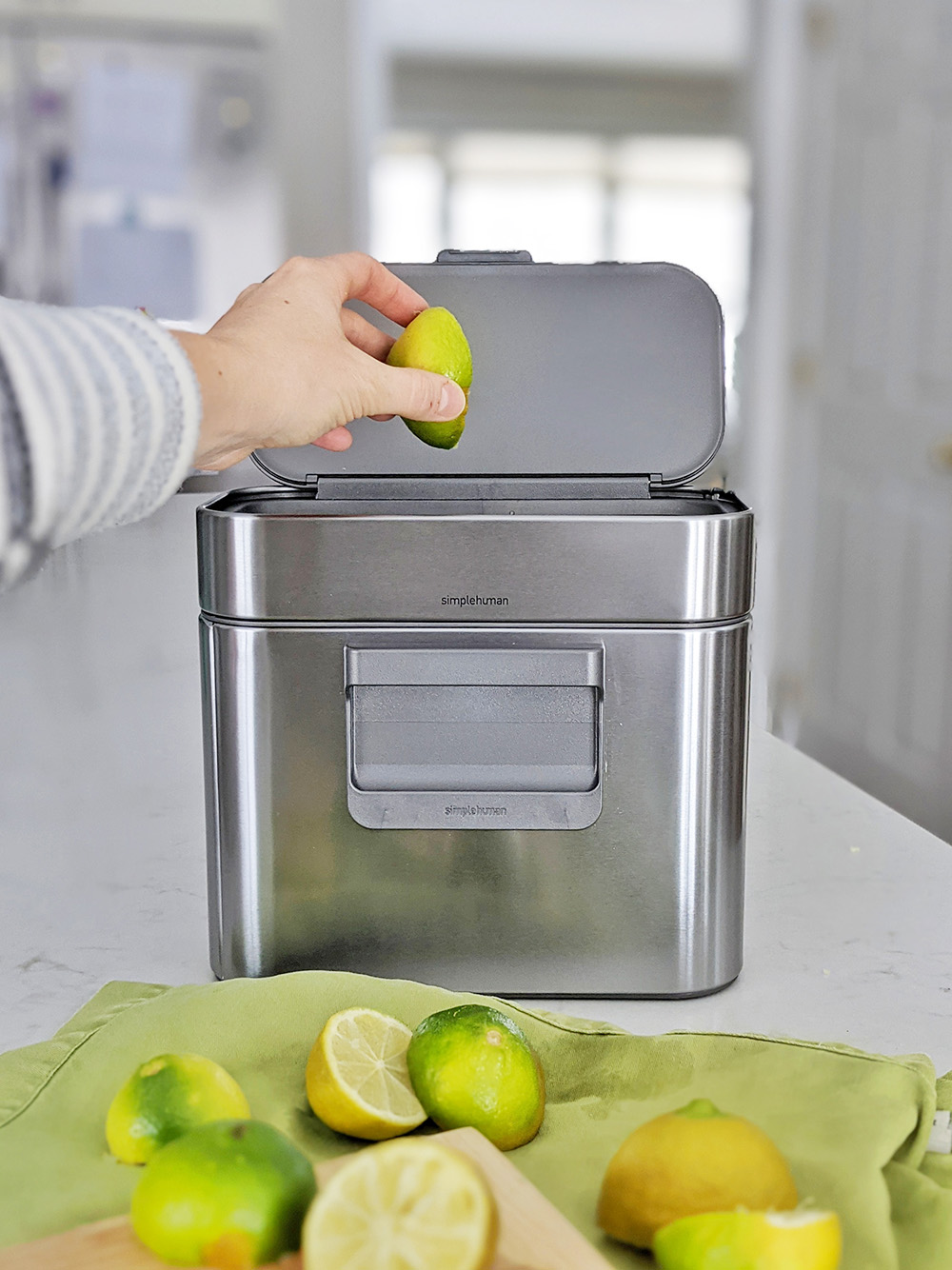

So, I had a listing for a cat tree on Facebook Marketplace. I got a hit, and they said “I can pick it up right now” – it was 8pm. I said, tonight is not good, what time can you come by tomorrow? I’ll leave it outside the front door. They said “10 am, cash or Venmo?” I replied cash, leave it under the mat. Then they asked for my address – which I gave them (unfortunately) and said “I’ll send a verification code to make sure your post is real and then text me the code”. What? Never heard of that, so I had that gut feeling this was a scam. I googled what that ‘code thing was’, and learned that it absolutely could be a scam and a way for people to access your personal information! I said as much in my text and cancelled the transaction. My fear though – they DO have my address! I live alone and now am nervous about it! Should I be? Thank you for your response!
Sorry to hear this happened to you. I had a similar scammer try a Venmo scheme on something I was trying to sell. While there are so many legitimate ways to use Facebook Marketplace, we do need to be vigilant because people do use it for scams. Such a bummer.
The points mentioned here are really good, I found more information over here as well.
https://tech-splash.com/how-to/avoid-facebook-marketplace-scams/
I have found that when you post something, and you immediately get hits that ask you for your phone number, or they want you to text them, or they have no profile, and it says they have created the post, they are scammers! Believe me it happens to me all of the time. When somebody asked me for my phone number right off the bat I will say to them, I only communicate on Facebook Marketplace, because there are too many scammers out there that I will report. That will nine times out of 10, have them leaving the post. The 10th person will ask for my phone number again. LOL
I agree. This has happened to me with larger items (like furniture especially). It feels similar to the Zelle scam where they ask for your Zelle information pretty aggressively. There are definitely some great things about FBM but you need a healthy dose of skepticism. 🙂 Thanks for sharing!
Please don’t waste the police’s time asking them to drive by your house. Use eBay or something instead you have to
That’s a great point. Thanks for mentioning it.
Thank you for writing content about Facebook marketplace seller red flags to watch out for as a buyer.